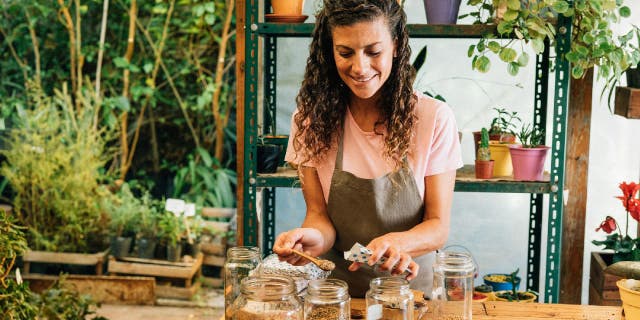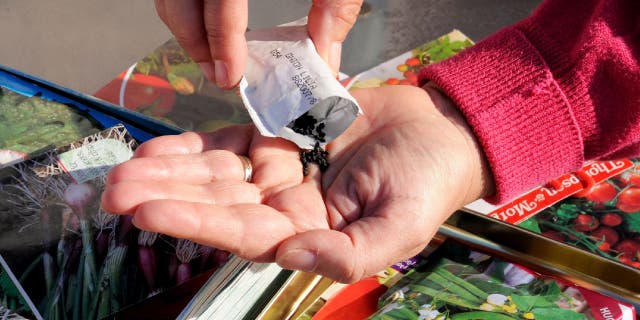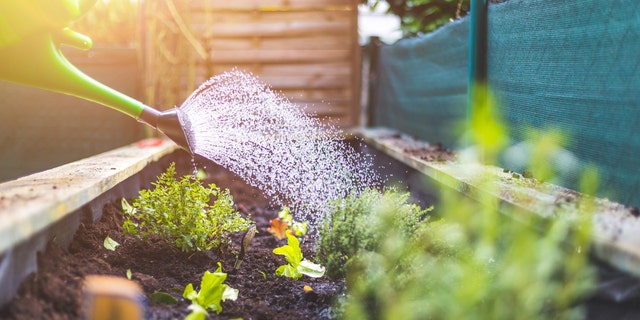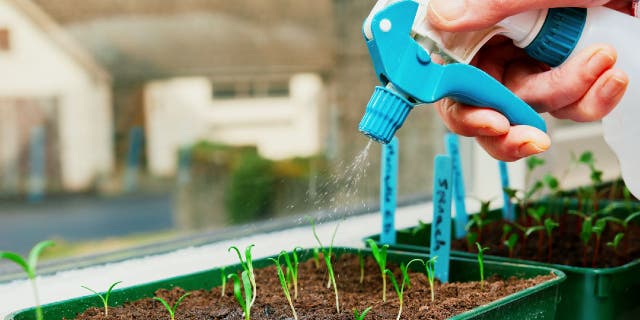Great gardening tips: How to save fruit and vegetable seeds for next year
NEWYou can now listen to Fox News articles!
As a new season of the year approaches, novice gardeners with leftover seeds may be wondering whether to throw out their packets or save them for next year.
This could be of particular interest to Americans who are making orchards a priority as this year’s inflation continues to hit staples.
Gardening experts have a few seed storage tricks up their sleeve.
BEGINNERS’ GUIDE TO GARDENING
Here are four smart gardening tips for those looking to save seeds for a future harvest.
Which seeds last a year or longer?
Most store-bought seeds and seed-filled products are “hybrid strains” and typically don’t yield seeds capable of germinating and propagating, according to Justin West, co-founder and CEO of Thrive Lot, an online Knoxville, Tenn. gardening platform.
GARDENING 101: HOW TO GROW YOUR OWN FOOD as inflation holds an all-time high
“If you want to store seeds and repopulate your gardens and orchards, you need to start with heirloom varieties,” he told Fox News Digital.

Gardening is the care and maintenance of plants. Almost all heirloom seeds can last a year or more if stored properly, one expert said.
(iStock)
West said almost all heirloom seeds can last a year or more if stored properly.
“Lead, peppers, parsnips and onions only last a few years,” West said.
HOW GARDEN SITTERS HELP KEEP PLANTS ALIVE DURING END-SUMMER TRAVELING
“The longest-lived seeds are beans and corn,” he said.
“Beans have germinated after more than 100 years in ideal storage conditions.”
How should seeds be stored?
It is possible to save seeds for future planting, but gardeners should ensure their storage plans keep seeds in optimal conditions.
“Beans have germinated after more than 100 years in ideal storage conditions.”
“Seeds should be stored in a cool, dry place away from sunlight,” said Stacie Krljanovic, senior groundskeeper and consultant at Patio Productions, a patio furniture and gardens marketplace in San Diego, California.
Garden seeds need to be stored in a sealed container to avoid mold and mildew growth, she told Fox News Digital.

Keep seeds away from heat sources when storing, said one expert.
(iStock)
She said it’s also important to keep seeds away from heat sources like radiators or heaters, as these heat-producing devices can dry out seeds and render them unusable if care isn’t taken.
2022 CHRISTMAS TREE SUPPLY: WILL DROUGHT AFFECT THE CHRISTMAS PERIOD?
“Make sure your seed storage area is rodent-proof so mice, rats or other pests don’t eat your seeds before you’re ready to plant them,” Krljanovic added.
According to Krljanovic, carrots, cucumbers, peas and tomatoes can usually be stored for up to five years.
Meanwhile, zucchini and spinach typically have a shelf life of up to eight years—while onions and garlic can typically be stored for up to 10 years.
When is the best planting time?
In the northern hemisphere, most fruit and vegetable seeds can be planted in spring, according to the West of Thrive Lot.
Gardeners should start their new plants indoors to give those plants the best chance of success.
He recommends gardeners start their new plants indoors so those plants have the best chance of success.
“Especially for young fruit trees, you [can] Start them in small pots and keep them well watered until late fall, then plant them right after the first frost,” West told Fox News Digital.

Fruit, vegetables and herbs can have an optimal planting time.
(iStock)
Vegetables, on the other hand, have an ideal growing season, according to West.
“Many [vegetables]like lettuce, can be grown several times a year depending on the climate,” he said.
“So you can start with some lettuce in early spring, some in summer, and even more in fall [across] most of the United States”
CLICK HERE TO GET THE FOX NEWS APP
Some seeds need cooler weather to germinate, while others need warmth, said Katie Burdett, owner of Growing with Gertie, an organic gardening and slow food blog. She lives in Lakeside, Michigan.
“For best results, plant cool seeds like lettuce, spinach, kale, radish, beets and bok choy in spring and fall,” Burdett told Fox News Digital.
She added, “Other heat-loving crops such as tomatoes, peppers, eggplant, corn and zucchini should be planted in late spring or early summer, depending on the growing area.”
How can you put your seeds to the test?
While most seeds can be saved for future use, gardeners can test their viability before planting them in an outdoor garden bed.
“If you find older seeds that you want to use, you can do a germination test,” said Deborah Niemann, a six-time author at Homestead in Joliet, Illinois.
Germination tests can help gardeners find out if their seeds are doing well if they germinate after exposure to water.
She also owns and operates the Thrifty Homesteader, a blog and academy for self-reliant living.
FOLLOW US ON FACEBOOK FOR MORE FOX LIFESTYLE NEWS
Niemann said germination tests can help gardeners figure out if their seeds are doing well if they sprout after exposure to water.
She recommends soaking the seeds for a few hours (ideally in a jar with a sprout lid), basting them with water, and rinsing them several times over the course of two or three days to keep the seeds moist.

Leaves sprout from germinated seeds, which protrude from the ground when planted.
(iStock)
Alternatively, for small seeds, Niemann recommends using damp paper towels to add moisture if a germination cover is not available.
The paper towels can be sprayed several times a day; or wrapping them lightly in plastic will keep the seeds moist.
Germination times vary by plant, so it’s best to consult seed packets to see how long it takes for moistened seeds to germinate, Niemann said.
CLICK HERE TO SUBSCRIBE TO OUR LIFESTYLE NEWSLETTER
“By doing a germination test, you don’t waste time planting seeds that are no longer viable,” Niemann told Fox News Digital.